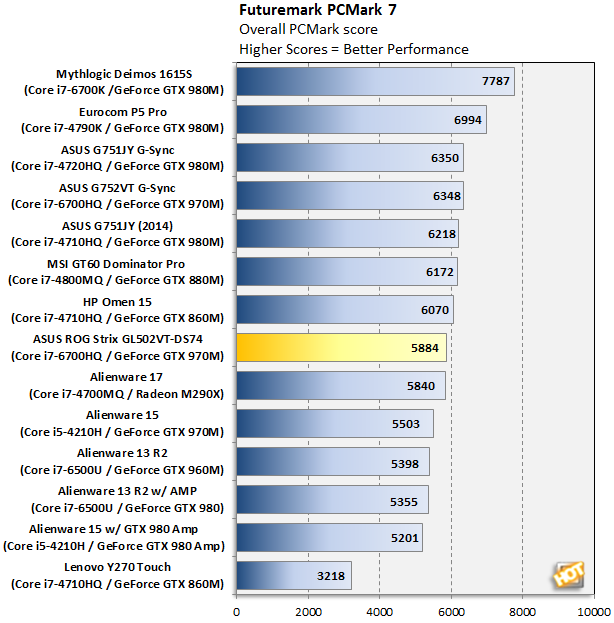ASUS ROG Strix GL502VT-GS74 Gaming Laptop Review
|
Futuremark’s PCMark 7 is a well-known benchmark tool that runs the system through ordinary tasks, including word processing and multimedia playback and editing. Graphics and processor power figure prominently in this benchmark, but graphics power doesn’t play as big a role here as it does in another Futuremark benchmark, 3DMark (which is designed for testing the system’s gaming capabilities). This test also weights heavily on the storage subsystem of a given device.

The ROG Strix GL502VT-DS74 scored 5,884 in PCMark 7, placing it around the middle of the pack. Compared to similarly equipped systems, it beat out the Alienware 15, which is based on a previous generation Haswell processor, but finished about 500 points below the ASUS ROG GL752VT-DH72, a laptop that based on the same CPU and GPU pairing. The difference maker between the two systems was the SSD—the ROG GL752VT-DH72 has the advantage of a PCIe-based SSD, versus the M.2 SATA3 SSD in the GL502VT-DS74. It doesn't make a big difference in terms of how fast either system feels, but PCMark 7 is a benchmark that tends to favor faster storage options.
|
Based on Maxon Cinema 4D software, this test uses a 3D scene and polygon and texture manipulation to assess GPU and CPU performance. We ran the full CPU test, which uses all available cores, as well as the graphics-oriented OpenGL benchmark.

Here again the ROG Strix GL502VT-DH74 takes its place in the middle of the pack, keeping right in line with other systems running NVIDIA's GeForce GTX 970M GPU.
|
Futuremark designed 3DMark Fire Strike for desktop PCs, but today’s heavy-duty gaming laptops have the chops to take on the high-resolution texture, tessellation and other components of the test.

3DMark's Fire Strike Extreme benchmark highlights the difference in performance between NVIDIA's GeForce GTX 970M and 980M GPUs. With a score of 3,401, the ROG Strix GL502VT-DH74 is bunched together with the two other laptops running the same GPU, while those configured with a 980M score in the neighborhood of 4,300 to 4,400.
Here's how the two GPUs compare in specs:
| NVIDIA GeForce GTX 970M |
NVIDIA GeForce GTX 980M |
|
| CUDA Cores |
1,280 |
1,536 |
| Base Clock | 924MHz +Boost |
1,038MHz + Boost |
| Memory Clock |
2,500MHz | 2,500MHz |
| Memory Bus |
192-bit | 256-bit |
| Memory Bandwidth |
120GB/s | 160GB/s |
Now let's take a look at how the ROG Strix GL502VT-DH74 fares in non-synthetic gaming benchmarks.







